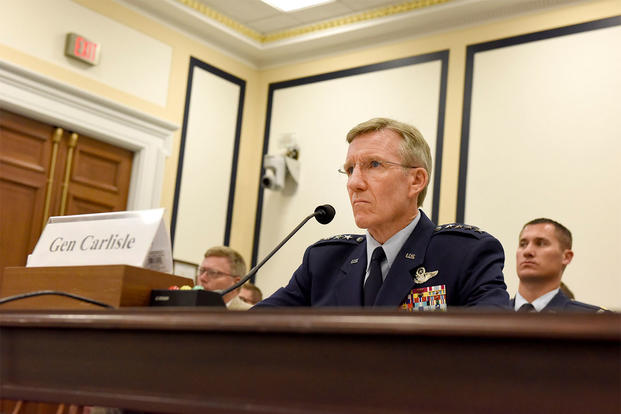The Pentagon should consider more discussions with Russia as the battlespace continues to grow more complex in Iraq and Syria in the fight against the Islamic State, a top U.S. Air Force general said Friday.
"There is room to elevate [talks with Russia]," Gen. Herbert "Hawk" Carlisle, head of Air Combat Command, told reporters during a breakfast in Washington, D.C. "We have constant communication with the Russians and, when we do, the deconfliction is incredibly valuable."
The Washington Post reported senior U.S. military officials are considering more talks, even if it could be construed as increased cooperation with Moscow. Carlisle, who will retire next month after leading the command since 2014 and having almost 40 years in service, said while he has not been intimately involved in the ongoing discussions, it's an obvious choice.
"Increased dialogue has got to happen because it's going to become more and more complex as time goes on. And as we continue to squeeze ISIS and continue to take more territory away from them, it becomes more complex," he said. "I think we have to continue to work that avenue because in the defeat of ISIS, everything we do ... as we work together with the Russians [is] incredibly important in the deconfliction -- to [avoid] any miscalculations, any mistakes, any unintended consequences."
Carlisle continued, "To me, it makes sense. The more you can build an understanding between those flying in the same … airspace, the better off you're going to be."
The U.S. is operating under a memorandum of understanding signed in 2015, which established a phone "hotline" the militaries could use to alert one another of actions they're taking in Syria.
Officials including the Air Force's top general in the Middle East, Lt. Gen. Jeffrey Harrigian; U.S. Central Command commander Gen. Joseph Votel; and Lt. Gen. Stephen Townsend, commander of the Combined Joint Task Force-Operation Inherent Resolve, are weighing new options with Defense Secretary Jim Mattis, Carlisle said.
The reasons to do so are mounting, he added.
"It's a dense surface-to-air threat in portions of Syria," Carlisle said. Aircraft must be ready at all times to act, he said, because "the [surface-to-air missile] systems the Russians and Syrians have over there are active systems."
He clarified that while the SAM systems are operative, they're not necessarily painting U.S. aircraft with target tracking radars "to any great extent that I know of."
Mattis, during his trip last week to Europe to reassure NATO allies on emerging Russian threats, assured them that Russia's actions within Syria and in Ukraine and the Baltic states are not looked on favorably by the U.S.
"Russia's aggressive actions have violated international law and are destabilizing," he said during a speech to NATO defense ministers in Brussels.
Mattis said of further military cooperation, "Russia is going to have to prove itself first."
-- Oriana Pawlyk can be reached at oriana.pawlyk@military.com. Follow her on Twitter at @Oriana0214.
Related Video:
Two Minute Brief: US - Russia Relations





























